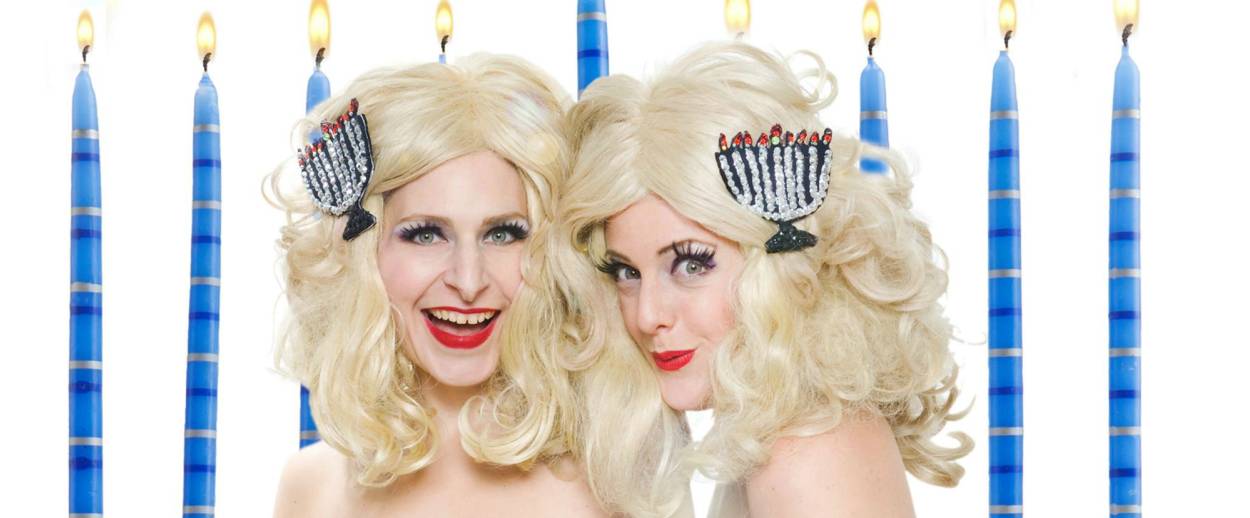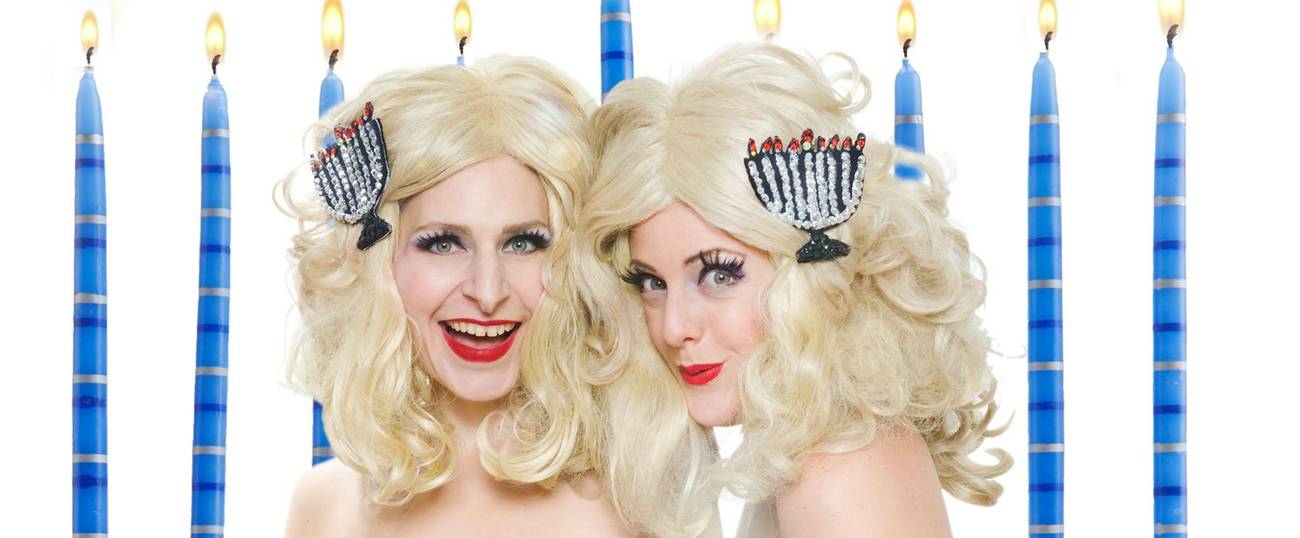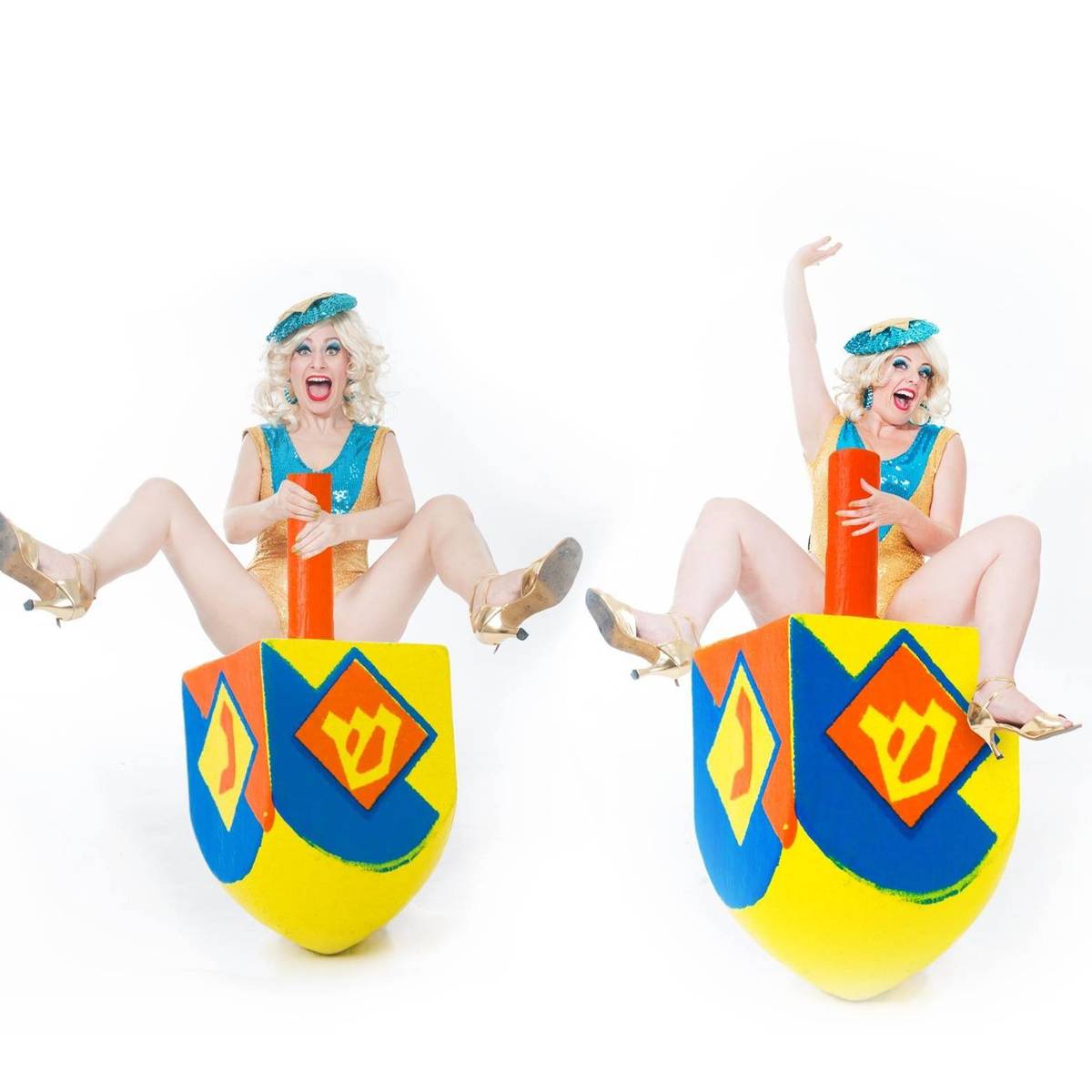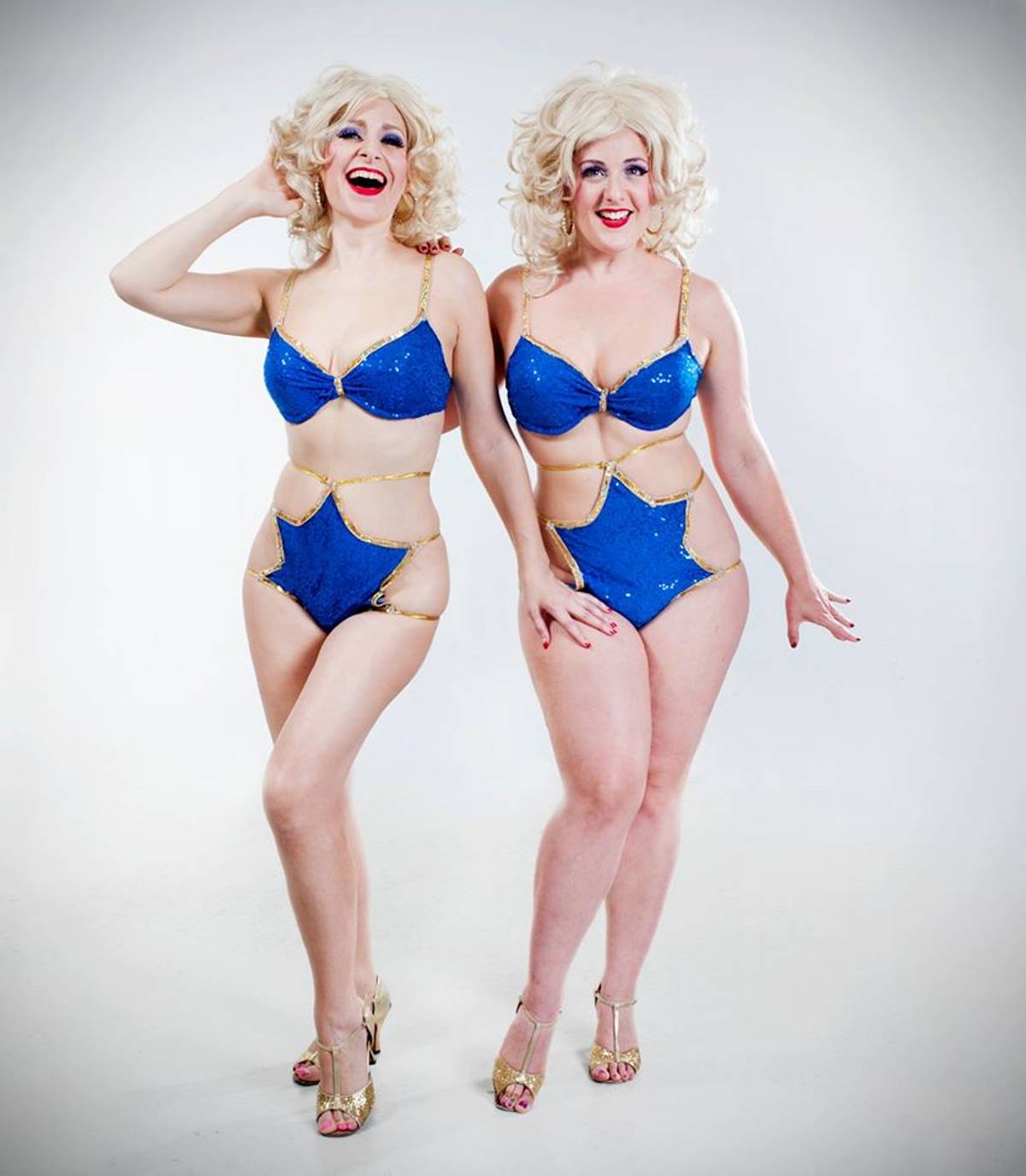The Dreidel-Straddling Schlep Sisters Are a Hanukkah Miracle
Burlesque duo Darlinda Just Darlinda and Minnie Tonka are performing on Christmas Eve in New York City




Nu, New Yorkers: What are your First Night of Hanukkah plans? You could do worse than to spend Christmas Eve (a minor Christian holiday that is apparently also celebrated in December) at the 10th Annual Menorah Horah at the Highline Ballroom. There, the Schlep Sisters—NYC’s premier Star-of-David-spangled shayna maidels— will be performing with “Hanukkah’s Hottest Hebrew Hotties” in a celebration of this festive, oil-slicked holiday. There will be latkes.

The Schlep Sisters, who co-produce the Menorah Horah as well as star in it, are funny women who take burlesque seriously. They’ve performed across the United States and in Canada, Sweden, Italy, Australia, the UK, Austria, and Finland. Darlinda Just Darlinda, the stage name of one-half of the duo, has performed with off-Broadway faves Taylor Mac and Julie Atlas Muz, lectured at Yale, and won a Golden Pastie Award for Biggest Hair. (I probably should have listed that honor first.) Her partner in pasties, Minnie Tonka, who originally hails from the Land of 10,000 Lakes (duh), has been voted a top-40 International Burlesque Industry Figure every year since 2010. She also holds a Masters in Jewish Education and has worked in numerous Jewish communal organizations.
I interviewed the Schlep Sisters on the phone, and it was sometimes hard to tell who was talking. Like many Jews, they talk fast, and like many sisters —real or theatrical—they complete each other’s sentences. “We met at an afterparty for International Buy Nothing Day in November 2003,” Minnie told me. “I remember we were randomly sitting on a velvet couch and we were both kind of drunk.” Darlinda continued, “And I’d just moved to New York from Monterey, California, and I had a background in dance, and—” Minnie took over again: “And I had just started work as the Director of Arts and Jewish Culture at a non-profit, and I was so excited about my new job and supporting other artists and having a creative outlet for myself, and we started talking about doing burlesque.”
Darlinda went on, “I’m from California, from a hippie background,” she said. “I had a female rabbi who sat in the front row of my show. Nudity was never weird for me. But to me, burlesque is less about stripping and more about telling stories using the joy of nudity and the freedom to create new forms of expression.”
Minnie, who had studied both dance and figure skating, was much more hesitant about the idea of doffing her duds. She said dryly, “I grew up in Minnesota, and it’s too cold to get naked. I am not from a hippie community.” Nevertheless, the two started experimenting with performing together, and did their first show in February 2004. “We did a reverse strip to ‘Hava Nagila,’ ” Darlinda recalled. “We started in undies and pasties and put all these clothes on in a fast, furious, funny way.”
The two were soon performing at the 14th Street Y and around the city; the first Menorah Horah was in 2007. “We have a Maccabee number that tells the story of Hanukkah through striptease, using a montage of ‘80s music,” Minnie said. “It starts with Foreigner’s ‘Urgent,’ and of course it has The Bangles’ ‘Eternal Flame.’ We have swords and shields. We also do a heavy metal version of ‘Hanukkah, Oh Hanukkah.’”

There are videos online of The Schlep Sisters performing a mashup of “There’s a Party in My Pants (And Everybody’s Coming)/Heveinu Shalom Aleichem” at the Helsinki Burlesque festival, and a reworked version of Chaka Khan’s “I Feel for You” (now rendered as “I Feel for Jews”) which includes the innovative rhyme of “schnorrer” with “kayn eyn hora.”
The process was a sharp learning curve for Minnie. “It took me three years to feel comfortable wearing a g-string on stage,” she said. “Darlinda was not happy with me because I was so bashful. Some people jump right in, but I needed time.” Eventually, she came to love it. “Burlesque has been incredibly healthy for me. The community is so supportive,” she said. “Behind the scenes, it’s so intimate; you’re getting dressed and undressed in front of people; it’s raw and emotional. Someone in the audience always comes up to me afterward and says, “You look like me! You made me feel so good about my body!’ That’s powerful and wonderful and important.”
Both women feel a strong bond with Judaism. “There’s a huge connection between Jews and show business and burlesque, and when I perform, I feel connected to my heritage,” Darlinda said.
Indeed, as the two spoke, I kept thinking of Sophie Tucker and Bette Midler and the tradition of brazen Jewish women who were just too much—too loud, too curvy, too sexual, too theatrical. I was reminded of historian Jenna Weissman Joselit’s writing about the “Ghetto Girl,” the young, working-class Jewish woman at the turn of the century who wore too much makeup and talked too brassily. In 1918, then-popular novelist Fannie Hurst spoke to the American Weekly Jewish News about vulgar Jewish female taste, which she blamed on “the vivid, aggressive temperament and imagination of the Jew.” The New York Tribune mocked the flashy style of downtown Jewish girls: “Does Broadway wear a feather?” the paper asked rhetorically. “Grand Street does two.”
One way to deal with mockery and marginalization is to embrace it and take ownership. That’s what The Schlep Sisters try to do. “Our act is celebratory, fun, playful,” Minnie said. “It’s burlesque you can bring your grandma to.” Darlinda interrupted, “I did bring my grandma. She came to our show at Bimbo’s in San Francisco. She loved it.”
Last year, the duo performed in Germany. “Being there was powerful,” Minnie said. “The feeling of being able to reclaim our culture and be joyful, and to embrace our art and culture and performance and spirit as a community…it was like, ‘you can’t take that from us.’ We were performing this upbeat song in a club in Hamburg with tears of joy rolling down our faces.”
Related: The Last of the Red Hot Mamas
Marjorie Ingall is a former columnist for Tablet, the author of Mamaleh Knows Best, and a frequent contributor to the New York Times Book Review.